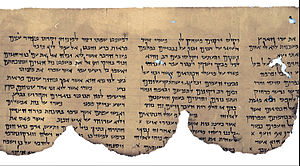
Pesher (/ˈpɛʃər/ ⓘ; Hebrew: פשר, pl. pesharim), from the Hebrew root meaning "interpretation," is a group of interpretive commentaries on scripture. The pesharim commentaries became known from the discovery of the Dead Sea Scrolls. The pesharim give a theory of scriptural interpretation of a number of biblical texts from the Hebrew Bible, such as Habakkuk and Psalms.
The authors of pesharim believe that scripture is written in two levels; the surface level for ordinary readers with limited knowledge, and the concealed level for specialists with higher knowledge. This is most clearly spelled out in the Habakkuk Pesher (1QpHab), where the author of the text asserts that God has made known to the Teacher of Righteousness, a prominent figure in the history of the Essene community, "all the mysteries of his servants the prophets" (1QpHab VII:4–5). By contrast, the prophets, and other readers of the texts, only had a partial interpretation revealed to them.[1] The result of this pesher method creates a fixed-literary structure, which is seen most in the continuous Pesharim, with the goal of giving the plain meaning of the prophets' words.[1]
© MMXXIII Rich X Search. We shall prevail. All rights reserved. Rich X Search
